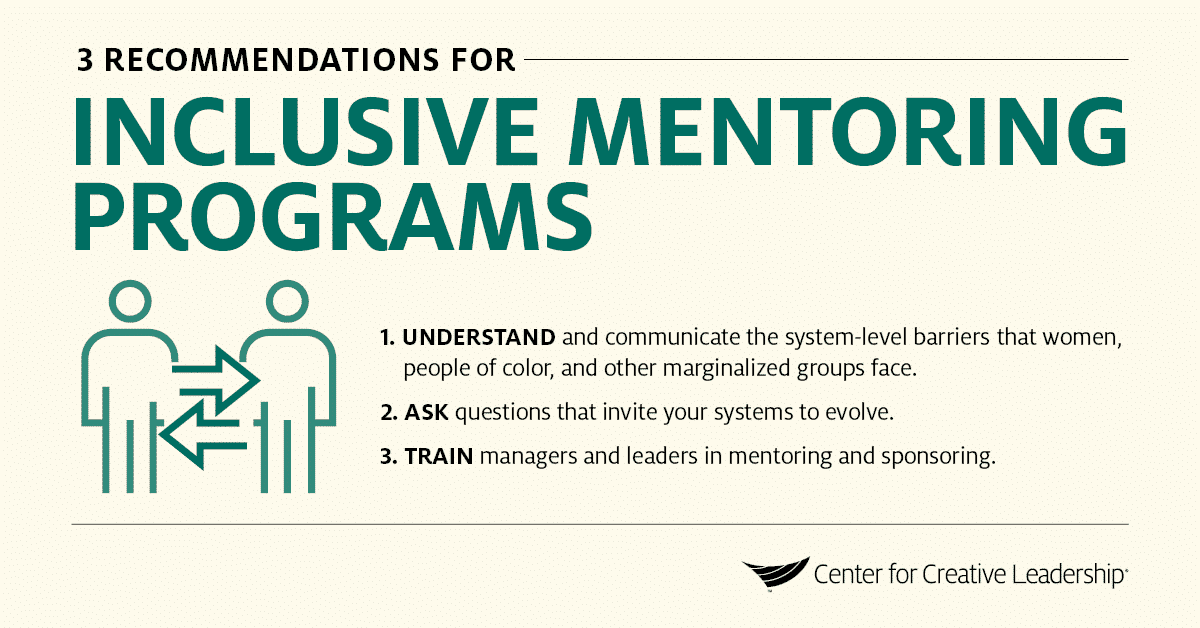“We tried mentoring once, but it never really worked. Anyway, people find their own mentors informally. What I need to know is how to fill my leadership pipeline.”
This is a common refrain we hear from senior HR leaders. Yet, mentoring in organizations is ideal for helping to retain top talent and build a leadership pipeline.
Many high-performing organizations consider mentoring a key competency among their leaders — and leaders who take mentoring seriously and handle it effectively have a profound impact.
Whether it’s a formal or informal arrangement, mentoring at work benefits everyone involved: the mentor, the mentee, and the organization that supports it. Effective mentors develop the leadership capacity of their mentees, while increasing their own skills. They nurture the alignment between employee aspirations and organizational imperatives, and they create depth and loyalty within their organizations. Plus, they transfer their knowledge and expertise back into their organizations.
Here are some of our research findings, insights, and recommendations on mentoring in organizations to help you structure an effective mentoring program.
First, What Is Mentoring at Work?
Our guidebook, Seven Keys to Successful Mentoring, defines mentoring as an intentional, developmental relationship in which a more experienced and more knowledgeable person nurtures the professional and personal life of a less experienced, less knowledgeable person.
Typically, a mentor has been in an organization or profession longer and has greater authority within the organization or profession than does a mentee. The combination of expertise and position enables a mentor to have significant impact on a mentee. (We say “typically” because reverse mentoring arrangements flip this model, and can also be highly beneficial.)
Mentoring at work can motivate individuals to learn and grow, expose them to learning opportunities, and provide support for the learning and growth. In many cases such relationships are mutually developmental, for mentor and mentee alike.
Who Benefits From Mentoring in Organizations?
Organizations benefit greatly from mentoring programs. Mentoring at work helps businesses attract and retain talent, and enhance organizational commitment among employees who seek developmental opportunities. Turnover decreases, and development accelerates. Typically, mentors have a well-developed view of organizational direction and dynamics, which they impart to mentees, and can better align a mentee’s efforts with organizational objectives, enhancing organizational capacity.
The people who are mentored benefit in numerous ways, gaining access to leadership opportunities, career mobility, better rewards and higher compensation, increased adaptability when facing new situations, improved professional identity, greater professional competence, increased career satisfaction, greater acceptance within their organizations, and decreased job stress and role conflict. Additionally, mentees enjoy some of the credibility and influence of the mentor through association.
And mentors themselves benefit as well. Many studies have shown that mentors are more satisfied with their jobs and more committed to their organizations than those who are not mentors.
And research has found that leaders judged as effective mentors by their direct reports had higher performance ratings from their bosses.
Mentoring at Work Helps Both New And Experienced Leaders
New leaders need support as they move from individual contributor to managing others. While this transition period has always been demanding, it’s been intensified by the COVID-19 pandemic, as emerging leaders are facing an unprecedented number of challenges in a changing world where disruption and uncertainty have become the norm.
Mentoring programs can help reduce and reframe personal, structural, and cultural barriers that may be holding emerging leaders back from achieving their full potential. Coaching and mentoring programs are particularly beneficial for developing new leaders.
Mentoring can also provide an excellent opportunity for more experienced staff who want to become managers. One of the biggest skill gaps that many managers have is the ability to coach, develop, and mentor their own direct reports. While developing employees is important for managers to do, many aren’t as strong at it as they need to be.
By serving as mentors at work, managers help mentees while also improving their own performance, gaining essential management skills, and increasing their job satisfaction. In fact, as noted in our white paper, we’ve found that those who mentor and advocate for others:
- Are perceived by others as more effective leaders;
- Have a stronger commitment to their organizations;
- Enjoy a greater sense of wellbeing, including increased job and personal satisfaction; and
- Strengthen their personal networks and get quicker access to job-related and organizational news.
In short, great leaders need to be mentored. And, great leaders need to mentor.
Access Our Webinar!
Watch our webinar, Empathy & Inclusion in the Workplace: Imperatives for Your Diversity Initiatives, to understand how to make your organization’s equity, diversity, and inclusion initiatives more effective and sustainable with a focus on building empathy and inclusion.
Mentoring in Organizations Can Build Stronger, More Inclusive Cultures
Research shows that diverse teams drive better business performance, and organizations with greater diversity become more resilient and innovative. Ideally, leaders in positions of power would mentor and sponsor talent — regardless of gender, race, or other social identities.
But because many senior executives aren’t doing this, the leadership pipeline at their organizations suffer, and they lose out on the potential of talented leaders — often and especially those who are women and/or people of color.
Ensuring your organization is focused on increasing equity and helping leaders of all identities and backgrounds to feel supported, valued, and engaged is a great place to start. All successful leaders need a network of champions to support them and advocate on their behalf, and mentoring (and sponsorship) programs can be an important step toward building a stronger and more diverse leadership pipeline at your organization.
We invite you to download our complimentary workbook on retaining talent and promoting diversity through mentoring and sponsoring.
Developing Inclusive Mentoring Programs in Organizations
3 Recommendations for HR Leaders
Even without a formal organizational mentoring program in place, talent management professionals can still attract and retain more talent by:
- Building organizational mentoring and sponsoring into leadership development efforts and onboarding processes;
- Creating formal programs to pair high-potentials with specific mentors and sponsors; and
- Encouraging a culture where mentoring and sponsorship of talent is expected.
The key for successful formalized programs around mentoring in organizations is to set clear roles and responsibilities, and to have clear objectives for establishing coaching and/or mentoring arrangements. To make those things happen, consider these 3 recommendations.
1. Understand and communicate the system-level barriers that women, people of color, and other marginalized groups face.
How can you help senior leaders understand what practices, procedures, norms, or behaviors might be seen as supportive or dismissive of talented people who are in minority or marginalized groups? Empathy and inclusion are imperatives for your organizational diversity initiatives to be sustainable and successful.
2. Ask questions that invite your systems to evolve.
Challenge assumptions when you hear them, and try to open up possibilities for different styles and skillsets. Ask what might be overlooked as you fill positions: “Here’s the profile of the last person in this job … but what abilities might we need now?” Look for ways to increase inclusive leadership practices across the organization.
3. Support leaders in mentoring and sponsoring by strengthening their coaching and conversation skills.
Don’t assume senior executives are clear about their role in helping other leaders, or that they know how to have developmental conversations, particularly with a mentee or sponsoree. If senior leaders are “expected” to mentor and sponsor more junior high-potentials, ensure these expectations are explicit and transparent — for example, included in the talent management, succession planning, or performance review processes.
Prepare executives for the unexpected by providing them with guidance, tools, leadership development, and support to know how to coach their people. To do this, you may want to explore avenues to help them build their self-awareness, listening skills, and confidence in coaching others through conversational skills training programs.
Some Final Thoughts on Mentoring at Work
There are lots of ways to structure mentoring in organizations. It can be an HR or organizational initiative, with formal structuring, monitoring, and organizationally-aligned goals, or it can be a more informal process developed by the parties involved with limited guidance from HR.
Whatever shape your organizational mentoring program takes, remember that the most successful mentoring programs include careful, strategic planning. Use these resources to develop your mentoring program and see the results of improved engagement, retention, and overall performance.
Ready to Take the Next Step?
Take advantage of our extensive experience in coaching and mentoring at work to help you start or refine a program that’s right for your organization. We invite you to download our complimentary workbook on promoting diversity through mentoring and sponsoring. We can partner with you to strengthen coaching and conversational skills across your organization as you build a more equitable, diverse, and inclusive culture.










